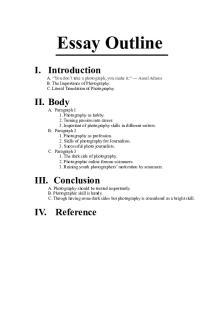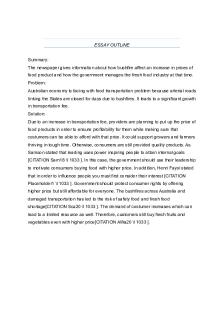Essay Outline and References Final PDF

| Title | Essay Outline and References Final |
|---|---|
| Author | Tanisha Blake |
| Course | Introduction to Management |
| Institution | University of Newcastle (Australia) |
| Pages | 10 |
| File Size | 349.1 KB |
| File Type | |
| Total Downloads | 32 |
| Total Views | 153 |
Summary
received 87%....
Description
GROUP ASSIGNMENT/ASSESSMENT COVER SHEET MNGT1001 MANAGEMENT
INTRODUCTION TO
List Group Members: Tanisha
Blake
3374141
Alex
Jones
3331507
Kobi
Morris
3354513
Maddie
Parkes
3375814
29/08/2021
Assessment Item Title:
ESSAY OUTLINE
TO1 G7 Tutorial and Group Number:
500 WORDS plus reference list – ended up being 555 including title Word Count:
Lecturer/Tutor Name: Dr. Limin Fu
ASSIGNMENTs WILL BE RETURNED WITHIN TWO OR THREE WEEKS OF THE DUE DATE Please tick box I verify that I have completed the online Academic Integrity Module and adhered to its principles
☒
I declare that this assessment item is the work of the students named above unless otherwise acknowledged and is in accordance with the University’s Student Academic Integrity Policy I certify that this assessment item has not been submitted previously for academic credit in this or any other course. I certify that I have not given a copy or have shown a copy of this assessment item to another student enrolled in the course. I acknowledge that the assessor of this assignment may, for the purpose of assessing this assignment:
Reproduce this assessment item and provide a copy to another member of the Faculty; and/or Communicate a copy of this assessment item to a plagiarism checking service (which may then retain a copy of the item on its database for the purpose of future plagiarism checking). Submit the assessment item to other forms of plagiarism checking.
Turnitin ID: (if applicable)
Name of person submitting:
27/08/2021
Date:
Tanisha Blake
Monetary Reward Is A Stronger And More Tangible Motivator For Employees Than Other Motivators. There has been a wide array of controversy as to whether monetary rewards are the stronger and more tangible motivator than other motivators. The aim of this essay is to produce valid arguments towards both sides of the argument, resulting in a clear and cohesive conclusion as to which is reasonable, and if there are any concessions necessary to achieve it. The essay will determine whether monetary rewards are the stronger and more tangible reward to receive for performance. Monetary rewards are a means of value contributing towards employees that achieve their given goals or target revenue for their business (for example, bonuses, gift cards, or awards). Two defined arguments that will support this proposition is that theories surrounding motivation are currently more influential in exerting those in pursuit of a reward. Therefore, it can positively relate to retaining employees' engagement and employment within the business to provide a sustainable and motivating working environment. However, when faced with constant competitiveness alongside high functioning workplaces, it can apprehensively lead to results like fear of failure, counter-productiveness, and unethical behaviours amongst workers. This may present itself in forms such as sabotage or conflict between teams which can damage the overall performance between employees. Furthermore, there are many other non-monetary options such as work flexibility that can outweigh monetary rewards due to repetitiveness and precognition. Employees can find themselves underappreciated and forego their positions to gain further recognition. To conclude, this essay argues that although monetary rewards are a valid motivator when rewarding good employees with their work efforts, non-monetary rewards may produce a more effective means of motivation.
Monetary rewards are used to successfully attract new potential employees and retain employees within a business/organisation.
(Aguinis, Joo, & Gottfredson, 2013)
Expectancy theories of motivation underline the base notion of an individual’s desire to receive a tangible reward in exchange for higher levels of motivation to be attained.
(Lloyd & Mertens, 2018; Jeffrey & Shaffer, 2007)
Monetary rewards are likely to result in counterproductive and unethical behaviours, as well as foster poorer performance due to the fear of failure.
(Aguinis, Joo, & Gottfredson, 2013)
Non-monetary rewards have proven to not only increase an employee’s engagement, but also their holistic approach towards motivation.
(Belgio, 2017)
Monetary rewards are used as a motivational tool to significantly enhance performance. These incentives positively attract employees to engage in exerted effort which results in a high functioning workplace environment. However, it is found that these rewards can persuade negative actions from employees promoting unethical behaviour to reach a targeted goal. Others argue these types of rewards can be damaging to individuals as they exert a sense of fear of failure and pressure, which leads to poorer performance. Further rewards with no monetary value such as promotions or honourable mentions within a business, will retain employee engagement as well as enhance their wellbeing. Employees that are recognised through these rewards will be motivated to perform better results to uphold representation. In
conclusion, although monetary rewards are more tangible, they can lead to poorer attitudes and performance in workers. For rewards to be effective, a healthy balance of monetary rewards can be introduced, however, non-monetary rewards have limited negative impact on employees and should be the main strong motivator in all workplaces.
References: Aguinis, H., Joo, H., & Gottfredson, R. (2013). What monetary rewards can and cannot do: How to show employees the money. Business Horizons, 56(2), 241-249. https://doi.org/10.1016/j.bushor.2012.11.007 Jeffrey, S., & Shaffer, V. (2007). The Motivational Properties of Tangible Incentives. Compensation & Benefits Review, 39(3), 44-50. https://doi.org/10.1177/0886368707302528 Lloyd, R., & Mertens, D. (2018). Expecting More Out of Expectancy Theory: History Urges Inclusion of the Social Context. International Management Review; Marietta, 14(1), 24-37,66. Retrieved 3 August 2021, from https://www.proquest.com/docview/2158501039?pqorigsite=gscholar&fromopenview=true. Belgio, E. (2017). Do Rewards and Recognition Drive Engagement? A Quantitative Study Assessing the Impact of Monetary and Nonmonetary Rewards on Employee Engagement (Ph.D.). Benedictine University. http://ezproxy.newcastle.edu.au/login? url=https://www-proquest-com.ezproxy.newcastle.edu.au/dissertations-theses/dorewards-recognition-drive-engagement/docview/1885103182/se-2?accountid=10499
Group Project Plan
Group Name: Group 7 Name and details of all group members Student Name: Maddie Parkes [email protected]
Student Email: Phone: 0450356488
Student Name: Tanisha Blake [email protected]
Student Email: Phone: 0497050535
Student Name: Kobi Morris [email protected]
Student Email: Phone: 0403066229
Student Name: Alex Jones [email protected]
Student Email: Phone: 0401156737
Tasks and Deadline and Responsibilities (add more if necessary)
Task
Due
Member/s Responsible
Select a proposition and its relevant topic in the textbook
8th August
All
Define the proposition and key words
9th August
Alex
Brainstorm possible arguments
10th August
Kobi
Read relevant chapter/s, course readings, media etc
14th August
All
Search for scholarly articles for each side of the 14th August arguments and related arguments
Tanisha
Agree on the arguments and conclusion
15th August
All except Kobi
Draft the topic sentences and add relevant citations under them
20th August
Kobi and Tanisha
Draft the conclusion ie your final position
21st August
Alex
Draft the introduction
22nd August
Maddie
Add the references in a Reference List
24th August
Tanisha
Edit the final copy (this is best done by one person, the appointed ‘editor’ of the group who should also submit to Turnitin)
25th August
Tanisha
Attach the Assignment Cover Sheet and Group Project Plan to the assignment
26th August
Tanisha
26th Submit assignment to Turnitin and check the Turnitin report (consider this should be whoever August submits to Turnitin eg the editor but ideally ever member should check)
Tanisha
28th August
Tanisha
Correct the assignment if necessary and resubmit (this must be done by the same person who first uploaded the assessment, the editor)
What are the agreed methods of communicating with one another (think group page)? First Preference:
Instagram
Second Preference: Blackboard/Zoom Planned meetings (at least three dates and times): 08/08/2021
How often, where, and for how long will the group meet? Frequency: dependant on availability of each group member Location: ONLINE- No location required Duration: minimum of 10mins
How will meetings be conducted? Chairing: Tanisha Decision-making: All members (in the case of a tie, we’ll flip a coin) Record keeping: Alex Other: Tanisha
When is it OK/Not OK to miss a group meeting? OK: If the event of an emergency or called into work Not OK: Partying, forgot etc.
What action/s will be taken if a member misses more than one meeting? Action One: Ask the member to attend the meeting and provide a reason Action Two: Let them know that it isn’t okay and if they don’t attend they may get marked down for not contributing. Note: If a group member leaves the course, inform the Course Coordinator immediately
What action/s will be taken if a member is not contributing or not completing work? Action One: Ask them to complete their work by the due date Action Two: Let them know that they will be marked down as they aren’t doing their fair share.
What action/s will be taken in the event of personal conflict in the group? Action One: Let them work at separate times Action Two: Discuss the possibility of working things out
List two behavioural characteristics that group members agree to emulate. Characteristic One: being mindful of others Characteristic Two: communicating effectively
Group Member Names and Signatures:
Name:
Tanisha Blake
Signature:
Name: Alex Jones
Signature:
Name: Maddie Parkes
Signature:
Name: Kobi Morris Signature: Kobi
Date: 8-8-2021
Proposition Ideas:
Monetary reward is a stronger and more tangible motivator for employees than other motivators (week 3).
Possible Arguments Long-run motivation (possible against) Short-run motivation (for)
GROUP OUTCOMES
What worked: getting the tasks done. What didn’t work: Not everyone showed up to meetings or had their sections completed on time....
Similar Free PDFs

Essay Outline and References Final
- 10 Pages

Organisational essay references
- 5 Pages

References
- 2 Pages

Lit and sports essay outline
- 3 Pages

Essay Outline
- 2 Pages

Essay Outline
- 1 Pages

Essay outline
- 3 Pages

Essay Outline
- 2 Pages

Essay Outline
- 3 Pages

References Sample
- 6 Pages

References - dasdasdasd
- 1 Pages

E-References
- 6 Pages
Popular Institutions
- Tinajero National High School - Annex
- Politeknik Caltex Riau
- Yokohama City University
- SGT University
- University of Al-Qadisiyah
- Divine Word College of Vigan
- Techniek College Rotterdam
- Universidade de Santiago
- Universiti Teknologi MARA Cawangan Johor Kampus Pasir Gudang
- Poltekkes Kemenkes Yogyakarta
- Baguio City National High School
- Colegio san marcos
- preparatoria uno
- Centro de Bachillerato Tecnológico Industrial y de Servicios No. 107
- Dalian Maritime University
- Quang Trung Secondary School
- Colegio Tecnológico en Informática
- Corporación Regional de Educación Superior
- Grupo CEDVA
- Dar Al Uloom University
- Centro de Estudios Preuniversitarios de la Universidad Nacional de Ingeniería
- 上智大学
- Aakash International School, Nuna Majara
- San Felipe Neri Catholic School
- Kang Chiao International School - New Taipei City
- Misamis Occidental National High School
- Institución Educativa Escuela Normal Juan Ladrilleros
- Kolehiyo ng Pantukan
- Batanes State College
- Instituto Continental
- Sekolah Menengah Kejuruan Kesehatan Kaltara (Tarakan)
- Colegio de La Inmaculada Concepcion - Cebu



